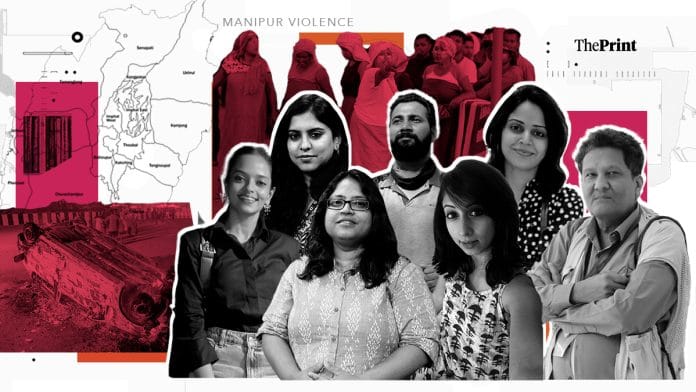New Delhi: The situation in Manipur continues to remain dire, 19 months after ethnic violence first broke out in the state. Since May 2023, reports by ThePrint’s journalists have provided a window into the horrors of the ongoing conflict between the Meitei and Kuki communities, highlighting the deepening tensions and voices from the ground.
These stories have been recognised by the International Press Institute (IPI), which has honoured five of ThePrint’s reporters and two photojournalists for their extensive coverage of the Manipur crisis.
Through powerful narratives, images and investigation, these ground reports capture the complexity of the situation and the toll it has taken on the residents of Manipur. ThePrint’s reporters criss-crossed the conflict zone amid the heightened ethnic divide to bring important stories about the crisis—both from the corridors of power and the people their decisions impact.
The IPI jury is headed by Justice Madan B. Lokur, a former Supreme Court judge. As a token of appreciation, an amount of Rs 20,000 and a Scroll of Honour will be conferred at an award ceremony at a later date. Apart from ThePrint, five other media houses have received IPI’s commendation.
ThePrint’s Karishma Hasnat, Ananya Bhardwaj, Moushumi Das Gupta, Sreyashi Dey and Sonal Matharu (formerly with ThePrint), along with photojournalists Praveen Jain and Suraj Singh Bisht, covered the Manipur crisis throughout 2023.
 Sonal Matharu: Matharu, formerly with ThePrint, travelled to Manipur during the initial stages of the conflict to uncover one of the biggest facets of the strife in Manipur—’revenge rape‘ amid the ethnic clashes. The silence surrounding these crimes has been one of the darkest aspects of the ongoing crisis.
Sonal Matharu: Matharu, formerly with ThePrint, travelled to Manipur during the initial stages of the conflict to uncover one of the biggest facets of the strife in Manipur—’revenge rape‘ amid the ethnic clashes. The silence surrounding these crimes has been one of the darkest aspects of the ongoing crisis.
She also reported how a mob attacked the residence of Rajkumar Ranjan Singh, Member of Parliament from Inner Manipur, in Imphal a day after the death of a Meitei man, underscoring the rising tensions in the region, with accounts of several survivors who were caught in the crossfire.
Here are some of the reports by Matharu:
IDs checked, skull cracked, ‘dumped alive’ in mortuary — 3 Kuki survivors recount Manipur mob horror
Police commandos, militants driving Kuki-Meitei violence? In Manipur, accusations fly
In Manipur, police armouries stand empty. Mobs stormed them, looted weapons, ‘rode off on scooters’
‘Begged mob to leave me, said I am a mother’: Kuki woman in viral video recalls 2-hr assault
 Ananya Bhardwaj: The unrest exposed ‘ethnic’ fault lines within the state police, which impeded combing operations to retrieve looted arms. Bhardwaj, ThePrint’s Senior Associate Editor, reported extensively on this divide within the state forces and its impact on the citizens.
Ananya Bhardwaj: The unrest exposed ‘ethnic’ fault lines within the state police, which impeded combing operations to retrieve looted arms. Bhardwaj, ThePrint’s Senior Associate Editor, reported extensively on this divide within the state forces and its impact on the citizens.
Apart from the chilling accounts of what led to deaths of people on both sides of the conflict, she also reported on the rise of Manipur’s Meira Paibis or Meitei ‘moms’. Meira Paibis, revered figures in the Meitei society, have taken on the role of vigilantes amid Manipur clashes. They say they are protecting their own, but security personnel call them controversial.
These are some of Bhardwaj’s stories:
Meitei village surrounded by 6 Kuki settlements defies violence with unity — ‘we grew up together’
‘Ignored & forgotten’ or ‘base of live insurgency’ — inside a Manipur SoO camp for Kuki insurgents
 Praveen Jain: ThePrint’s National Photo Editor, Jain, captured life at Kuki and Meitei relief camps in Manipur, telling the stories of inhabitants who found solace in each other’s joys & sorrows.
Praveen Jain: ThePrint’s National Photo Editor, Jain, captured life at Kuki and Meitei relief camps in Manipur, telling the stories of inhabitants who found solace in each other’s joys & sorrows.
He also brought glimpses of the lives of people from the Kuki community displaced from their village in Kangpokpi, and Meiteis displaced from their village in Tengnoupal’s Moreh, along with what a day in the lives of ‘Kuki’ insurgents at a Suspension of Operations camp in Manipur’s Chellep looked like.
Tears, tales of harrowing escape & a few reasons to smile — life at a Kuki relief camp in Manipur
 Sreyashi Dey: As violence ripped through the state in 2023, heart wrenching stories of death, rape and arson were being widely reported. But there was another tragedy, which was uncovered by Senior Assistant Editor Dey—the quiet fracturing of inter-tribe marriages of Kuki-Meitei couples.
Sreyashi Dey: As violence ripped through the state in 2023, heart wrenching stories of death, rape and arson were being widely reported. But there was another tragedy, which was uncovered by Senior Assistant Editor Dey—the quiet fracturing of inter-tribe marriages of Kuki-Meitei couples.
The raging hate on the streets took a deep toll on relationships that had initially defied the ethnic division.
Manipur violence has a silent victim—broken marriages of Kuki-Meitei couples
 Suraj Singh Bisht: ThePrint’s senior photojournalist Bisht also visually documented the distressing tales of survivors of sexual violence in conflict-ridden Manipur.
Suraj Singh Bisht: ThePrint’s senior photojournalist Bisht also visually documented the distressing tales of survivors of sexual violence in conflict-ridden Manipur.
No one wants to talk about rapes in Manipur. There’s a silence at the heart of the violence
More than 6 weeks on, Manipur is still ablaze. It’s a saga of failures, from state govt to Centre
 Moushumi Das Gupta: Deputy Editor Das Gupta travelled to Manipur multiple times to uncover the community divide among government officials and public servants, and how the Kuki-Meitei faultline in violence-hit Manipur triggered fears of ‘ethnic cleansing’.
Moushumi Das Gupta: Deputy Editor Das Gupta travelled to Manipur multiple times to uncover the community divide among government officials and public servants, and how the Kuki-Meitei faultline in violence-hit Manipur triggered fears of ‘ethnic cleansing’.
Bringing these stories from Manipur, about a week after the violence first broke out in the state last May, was not only challenging, but also fraught with risk. ThePrint’s report was the first to delve deep into how segregation has affected the social fabric of the north-eastern state, and impacted the administration and governance.
Kuki-Meitei faultline in violence-hit Manipur triggers fears of ‘ethnic cleansing’
‘How ridiculous’ — When neighbours fled neighbours as violence burnt down Manipur villages
 Karishma Hasnat: An important report by Special Correspondent Hasnat looked at how the eviction of a tiny village sparked fires across Manipur. The state authorities had bulldozed a Kuki settlement of K. Songjang on 20 Feb last year because it purportedly encroached on protected forest land, but the incident fuelled a series of protests and conflict.
Karishma Hasnat: An important report by Special Correspondent Hasnat looked at how the eviction of a tiny village sparked fires across Manipur. The state authorities had bulldozed a Kuki settlement of K. Songjang on 20 Feb last year because it purportedly encroached on protected forest land, but the incident fuelled a series of protests and conflict.
Hasnat also reported how the conflict revived insurgent groups, as the AFSPA debate heated up. One of her ground reports, filed two days after the violence on 3 May, 2023 described the immediate aftermath, and how people were escaping to safety, unsure if they would ever return to their homeland.
The internet services were barred, making it harder to reach out to government officials and authorities, but the reports around that time were filed through phone messages and narration of events over the phone to desk editors.
‘They came with 6 JCBs’— How eviction of a tiny village sparked fires across Manipur
Myanmar traders dodge bullets & bombs to sell in Manipur’s Moreh market. But no one’s buying
‘Gunfights, extortion’— Manipur’s ethnic conflict revives insurgent groups, AFSPA debate heats up
Also Read: Hushed voices, shutters down, Manipur conflict has turned bustling trade hub Moreh into a ghost town






